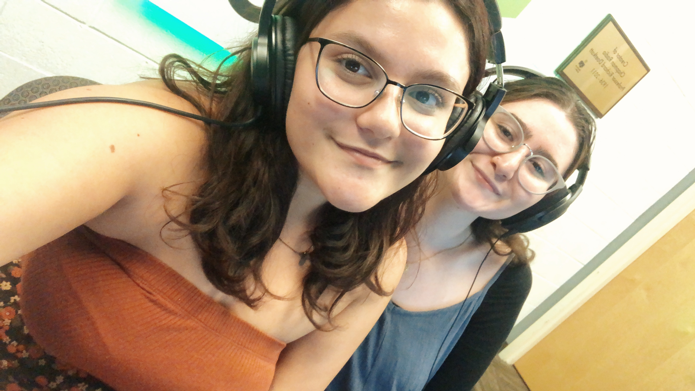
~~~~~~~~~~~~~~~~~~~~~~~~~~~~~~~
Chapman alumna Emily Duong – who graduated in Spring 2019 — started listening to podcasts in 2017. Two years later, she and her friend Siena Mirabella co-host a podcast of their own.
“I remember how impactful listening to podcasts was for me during that year, since I was going through a lot of personal adversity and saw how much it helped me in listening to podcasts,” Duong said.
ITunes started carrying podcasts in 2005. Since then, the platform has grown exponentially. Currently, there are more than 29 million available podcast episodes, according to Music MPH. Thirty-two percent of the population listens to podcasts monthly.
John Nielsen teaches ENG 415: Topics in Journalism – Podcasting for Journalists. His course allows students to create their own podcast and learn more about the field as a whole.
“It introduces students to the rapidly expanding corner of the podcast world that’s occupied by fact-based narrative podcasts such as This American Life, Radiolab, Invisibilia, Snap Judgement, The Moth and Ear Hustle,” Nielsen said. “Few of these podcasts existed 15 years ago. Now it feels like there’s a new one every day.”
Duong and Mirabella’s show, titled Young & Ambitious, is described as “life and self improvement for the modern day girl boss”.
“Our main target audience is females between the ages of 16 to 24, essentially a lot of Gen-Z and some of the younger female demographic in the millennial generation,” said Duong. “The main subject matter of our podcast is focused on discussing strategies to live your most fulfilled and well-balanced life through sharing our personal experience with self-improvement and growth.”
Duong said she believed that appeal of a podcast for many people is the ability learn new things and to listen while multitasking.
“Whether that is cleaning your house, getting ready for the day, cooking dinner, it’s saving consumers time and nowadays, most of what we are exchanging is time,” said Duong.
Chapman Radio offers a podcast-like platform where listeners can tune in to their own classmates and learn something new.

Sophomore art major Hannah Scott and sophomore political science and peace studies major Bree Gaff host a show on Chapman Radio called Music and Murder. The two discuss their favorite music along with a true crime case that interests them.
“I was inspired to start a radio show because I wanted to have a creative outlet that would allow me to talk about something that really interests me and have fun doing it,” Gaff said. “It also gives me a chance to work on my public speaking.”
The two women said that their target audience ranges from 18 to 60, and that it is for any adult to enjoy.
When asked about the newfound popularity of podcasting, Gaff said:
“In podcasts there is also more creative freedom in what people can produce and I feel that our generation is attracted to that quality.”
Emma Sexton, a freshman broadcast journalism and documentary major, is the host of a true crime and disaster podcast called Horrible Things Podcast. The podcast discusses murder cases, “I survived” stories, heists, and man-made disasters.
“I wanted to create a podcast geared more towards a younger audience that still discussed mature and interesting topics,” Sexton said. “I could talk about true crime all day so I thought, why not record it?”
Sexton said that podcasts have the potential to be long and informative, unlike much of the “bite sized” content on social media that has become so normalized.
“I think our generation loves podcasts because we are so damn busy,” said Sexton.
It is no surprise that a large percentage of podcast listeners are millennials and Generation Z.
At Chapman, many students consider themselves well versed in the world of podcasting.
With easy access to recording technology, anyone can be the host of their very own show.

Podcasts offer a new wave of entertainment for listeners, who can tune in to anything from true crime to discussions about mental health.
Podcast instructor Nielsen said students who make their own podcasts take on a wide range of topics that are generally focused on entertainment and fun.
“Most of the student podcasts I know about are either talk shows or fan magazines. If they aren’t ranking their favorite episodes of Game of Thrones or Survivor they’re talking to their friends about whatever comes into their heads,” said Nielsen.
Ashley Crum, a sophomore public relations and advertising major, said that podcasts keep her entertained on her commutes to school and work.
“Podcasts provide entertainment without any visual components, so it’s perfect for driving or multitasking,” Crum said.
For many listeners, the multitasking component is what keeps them coming back for new episodes. It is an easy way to get educated about a new topic.
For sophomore screenwriting major Morgan Shirk, podcasting has become a large part of her day and more than just another way to pass the time.
“I’m always quoting a podcast,” Shirk said. “A lot of podcasts that I listen to deepen my understanding of the world or challenge how I think. I also listen to French podcasts to strengthen my listening comprehension.”
Shirk said that podcasts offer different access to a more realistic type of entertainment.
“I think they’re popular because they’re personal. You’re listening to speakers engage in a real life setting instead of watching a TV show,” said Shirk.
Although the widespread popularity of podcasts is apparent, not everyone has come around to the idea.
Whitney Perschke, a sophomore film production major, said that she does not enjoy podcasts.
“I think I am someone who’s very visual based and podcasts can’t capture my interest the same way a television show or even a YouTube show does,” Perschke said.
Although she does not take part in listening, Perschke said she understood the appeal.
“I think they’re an escape that’s super easy for the public to consume, with very little participation needed on the audiences side,” said Perschke.
